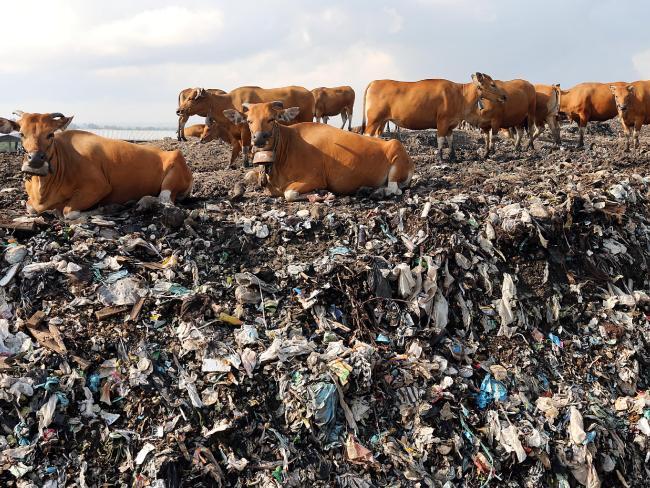JUST 6.4km from Bali’s tourist strip of Kuta is a massive pile of putrid garbage that grows day by day.
The tourist island’s main rubbish dump now covers 30 ha, reaches 20 metres high in places and every day 600 trucks bring another 1544 tonnes to add to the pile.
Bali’s Government says the garbage problem has now reached alarming levels, there are concerns of pollution and dangerous run-off. The garbage pile at the Suwung waste disposal centre is now even visible from the main road that runs between Sanur and Kuta.
Bali’s tourism is booming but public services are now struggling to cope and the Bali Government is calling for investors to help deal with the issue.
Trashpickers, seemingly oblivious to the noxious smells, pick through the mountain of garbage for anything they can salvage and sell off to recyclers — plastic bottles, tins, cans, metal — anything that can make them a few dollars.
Even the food, discarded by the hotels and tourist resorts, is collected to eat and feed their families.
About 650 trashpickers, in 13 different groups and collectives, go to work every day at the Suwung tip, to make a living. Their homes are shanties on the dump’s perimeter where they sort through and bag up their finds.
And local farmers send their cattle to graze the dump. Cattle, some up to their bellies in the stinking water, pick through the garbage, eating whatever they can find.
Apparently some are now so adept they can get dried noodles out of a packet to eat. But there are concerns about the danger of this given the cattle are sold on for meat, with the obvious dangers of disease.
Bali’s Deputy Governor, Ketut Sudikerta, says the garbage problem is alarming and the Government is now grappling with how to handle the pile that grows day by day.
“More tourists means more rubbish from the hotels. It makes me worried and it makes me concerned about how to handle this,” Mr Sudikerta toldNews Corporation.
“We must have a position on that, if now we will have a problem for the future and maybe tourists won’t want to come to Bali,” he said.
“At the moment we need the tourists, most of our income comes from tourists but as a tourist destination we have to take care of the culture and the environment. We have to find a solution to handle the rubbish problem.”
He says the Government is now calling for private investors to take over the garbage dump and possibly use the garbage to process renewable energy, natural gas and bricks.
Mr Sudikerta says there is also a need to better secure the dump’s boundary to stop liquid waste run-off polluting the ground and the nearby ocean. In addition there is the putrid smell caused by so much rotting garbage.
One issue is that currently the cost for each truck to dump its load is minuscule — 2500 Rupiah or $2.50 per small truck and 3500 Rupiah or $3.50 per large truck.
There have been calls for this amount to be increased to international standards and to make enough money for the Government to efficiently handle the problem.
Bali Environmental agency head Gede Suarjana, said the Suwung facility now had about 16 million tonnes of waste.
He said of the 1500-1600 tonnes per day deposited there, 70 per cent was organic and 30 per cent inorganic.
Mr Suarjana said there was water pollution around the Suwung facility but it does not exceed environmental standards.
Tests on 13 beaches also showed them to be safe for swimming.
“Processing the garbage is urgently needed. If we do not doing something now, the TPA Suwung can no longer accommodate the mounting garbage within the next four years,” Mr Suarjana said.
Back in June this year Bali’s Governor, Made Pastika, convened a meeting of officials from all regions involved with the Suwung waste disposal area in a bid to iron out a solution.
Mr Pastika said the amount of garbage was increasing two to four per cent each year and the land and space at the current dump was running out quickly.
“Currently, every truck that disposes garbage there only pays around Rp 2,500 to Rp 3,500 per tonne. It can be said, they are not paying, it’s too cheap,” Mr Pastika said.
He said charging more, in line with United Nations standards of almost 500,000 Rupiah per tonne or $50, would earn the Government more than 700 Million Rupiah per day and enable them to better handle the problem.
And in addition the State electricity company had expressed an interest in buying electricity generated from garbage management.
But so far no agreements have been reached and the Government is now calling for investors to come forward with ideas for the future management of Bali’s mounting garbage.
Source: Herald Sun











